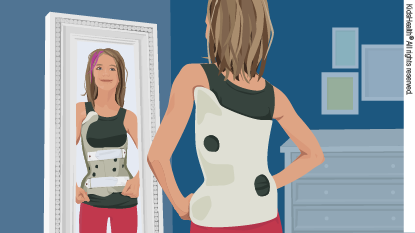- Parents Home
- Para Padres
- A to Z Dictionary
- Allergy Center
- Asthma
- Cancer
- Diabetes
- Diseases & Conditions
- Doctors & Hospitals
- Emotions & Behavior
- First Aid & Safety
- Flu (Influenza)
- Food Allergies
- General Health
- Growth & Development
- Heart Health & Conditions
- Homework Help Center
- Infections
- Newborn Care
- Nutrition & Fitness
- Play & Learn
- Pregnancy Center
- Preventing Premature Birth
- Q&A
- School & Family Life
- Sports Medicine
- Teens Home
- Para Adolescentes
- Asthma
- Be Your Best Self
- Body & Skin Care
- Cancer
- Diabetes
- Diseases & Conditions
- Drugs & Alcohol
- Flu (Influenza)
- Homework Help
- Infections
- Managing Your Weight
- Medical Care 101
- Mental Health
- Nutrition & Fitness
- Q&A
- Safety & First Aid
- School, Jobs, & Friends
- Sexual Health
- Sports Medicine
- Stress & Coping
Rigo Cheneau Brace
What Is a Rigo Cheneau Brace?
A Rigo Cheneau brace is a type of spine brace for scoliosis. These lightweight plastic vests are custom-made for each patient. Because everyone’s curve is different, each brace is unique. They’re hardly noticeable when kids wear them under clothing, usually for 12–20 hours a day.
Spine braces have been helping kids with scoliosis for many years. The Rigo Cheneau (REE-go sheh-NO) brace is a newer kind of brace. Many patients have had good results. Doctors keep learning more about which kids might get the most help from this type of brace.
How Does a Rigo Cheneau Brace Work?
In scoliosis, the spine curves side to side and also twists. A Rigo Cheneau brace puts pressure where the body needs it to straighten and unwind the curve. It has open areas that let the child’s body expand during breathing and exercise.
Kids who wear the brace often also do a special type of physical therapy to stop their scoliosis curve from getting worse. The brace aligns the bones in the spine, while the PT helps train and strengthen muscles. Together, they can improve a child’s posture.
What Does a Rigo Cheneau Brace Look Like?
The brace usually comes up lower on the ribcage in the front and higher under one or both armpits. Because the brace is custom-made, the person wearing it often can choose the color or pattern on the brace.

How Long Do Kids Need a Rigo Cheneau Brace?
How long kids wear a Rigo Cheneau scoliosis brace depends on their curve and when they stop growing. A scoliosis curve usually won’t get worse after a teen is done growing. So many teens can stop wearing the brace then. Sometimes doctors can tell that a brace isn't helping, so they stop early. When a brace doesn't work, the next step is often surgery.
What Problems Can Happen?
There are two main problems that can happen with any scoliosis brace:
- Some kids don't want to wear the brace. Wearing it as prescribed gives it the best chance of helping.
- Skin irritation from heat or rubbing can happen because the brace is designed to fit tightly against the body.
To prevent skin problems, kids should keep the brace clean and dry and wear a thin, tight-fitting, sweat-wicking shirt under it. Some redness is normal when wearing a brace. But call your doctor's office if:
- Redness doesn't go away within 30 minutes after taking off the brace.
- Your child gets blisters or sores.
- Your child gets a rash under the brace.
How Can Parents Help?
If your child has scoliosis, talk with your care team about treatment options. The best choice is not the same for every kid. If the team recommends bracing, they'll help you choose the best brace for your child.

© 1995- The Nemours Foundation. KidsHealth® is a registered trademark of The Nemours Foundation. All rights reserved.
Images sourced by The Nemours Foundation and Getty Images.
